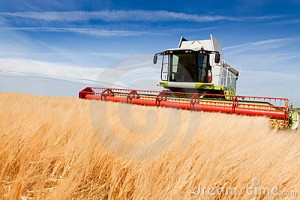 I wonder how many people, recognizing those four words, know who wrote them? It was Katharine Lee Bates, in 1893. Although some have said this song should be the American anthem – and certainly it is easier to sing than “The Star-Spangled Banner” – Francis Scott Key’s anthem commemorated a specific moment in the War of 1812, and a patriot’s love of the American flag.
I wonder how many people, recognizing those four words, know who wrote them? It was Katharine Lee Bates, in 1893. Although some have said this song should be the American anthem – and certainly it is easier to sing than “The Star-Spangled Banner” – Francis Scott Key’s anthem commemorated a specific moment in the War of 1812, and a patriot’s love of the American flag.
America’s wealth has been partly founded on its amber waves of grain: those endless prairies the settlers walked across to get to new homesteads and to reach the west coast. My novel “Skyscrapers” is located in a city called Powhaten. Like a tall steel-and-glass fence, Powhaten’s skyscrapers, in reaching ever higher for the sky, effectively separate the huge fresh-water reservoir of the Great Lakes from the endless prairies to the west. They do not speak of nature, but only of human ambition: the drive to build, strive, go ever higher and deeper and farther than ever before.
My protagonists, Vern Webb Sr. and Eleanora Torquemada Smith are “skyscrapers,” in that sense. There is no end to their ambition nor to their belief that they can accomplish whatever they set out to do. Neither has had an easy road to the top. I carefully selected the industry in which they would compete: farming equipment. Many American do not realize what a sophisticated piece of machinery a modern tractor is, filled with electronic devices which read the ground beneath and disperse the correct amount of seed for that area. Tractors are air conditioned, and full of complex hydraulic systems, all of which a farmer must understand since a day at the machine shop means a day of no plowing or planting or harvesting, whatever the season may be.
I learned a lot about the farm industry and its machinery when my husband worked for Case/International Harvester. I toured a tractor-assembly plant north of Paris, France, and was pleased my French enabled me to learn about the importance of “les hydrauliques” even in these tractors, which were smaller than American-built tractors and designed for the smaller fields of Europe and the Mediterranean area. Many were purchased by ex-Soviet satellites, where Vern has two agents scouting for business as the book opens.
Amber fields of grain are not where either Ellie Smith or Vern Webb grew up. Farm machinery is where they saw the opportunity for growth in a particularly “healthy” and “American” field of endeavor. But American farmers live an entirely different life than city dwellers. I recently sold a farm in western Illinois after twelve years of experiencing the unique rhythm of living according to the seasons. Among things I miss are the long vistas, the big skies, the prairie flowers, being aware of the stages of the moon, watching vast ranks of black clouds toss bolts of lightning at the ground, watching the snow mount, watching the earth tentatively come to life each spring, watching the vast migrations overhead…
City dwellers are not aware of these things to nearly the same degree. They merely translate into better or worse driving conditions and the indoor or outdoor sports seasons. City dwellers may live high above both lake and land in their towers, but no matter how high they built their beautiful, intellectually complex towers, it’s impossible to see the night sky in a city. Stars seen over rural land at night are very large and seem very close, almost intimate. It’s easy to see why ancient peoples thought the stars were the souls of the departed, watching over them in the dark night. Perhaps we all miss the stars without realizing it. Perhaps that is why we keep building taller and taller skyscrapers.
About the Author
Written by Jill Wilson Brennan
Jill lived in New York, Paris and London before settling in Chicago. She has had a very eclectic life, aspects of which appear in her new novel Skyscrapers. She has three children, all married, and serves as Director of a major children's hospital.



10 Responses to Amber Waves of Grain